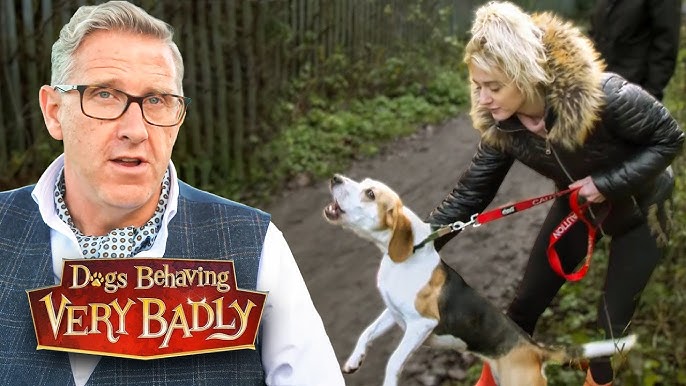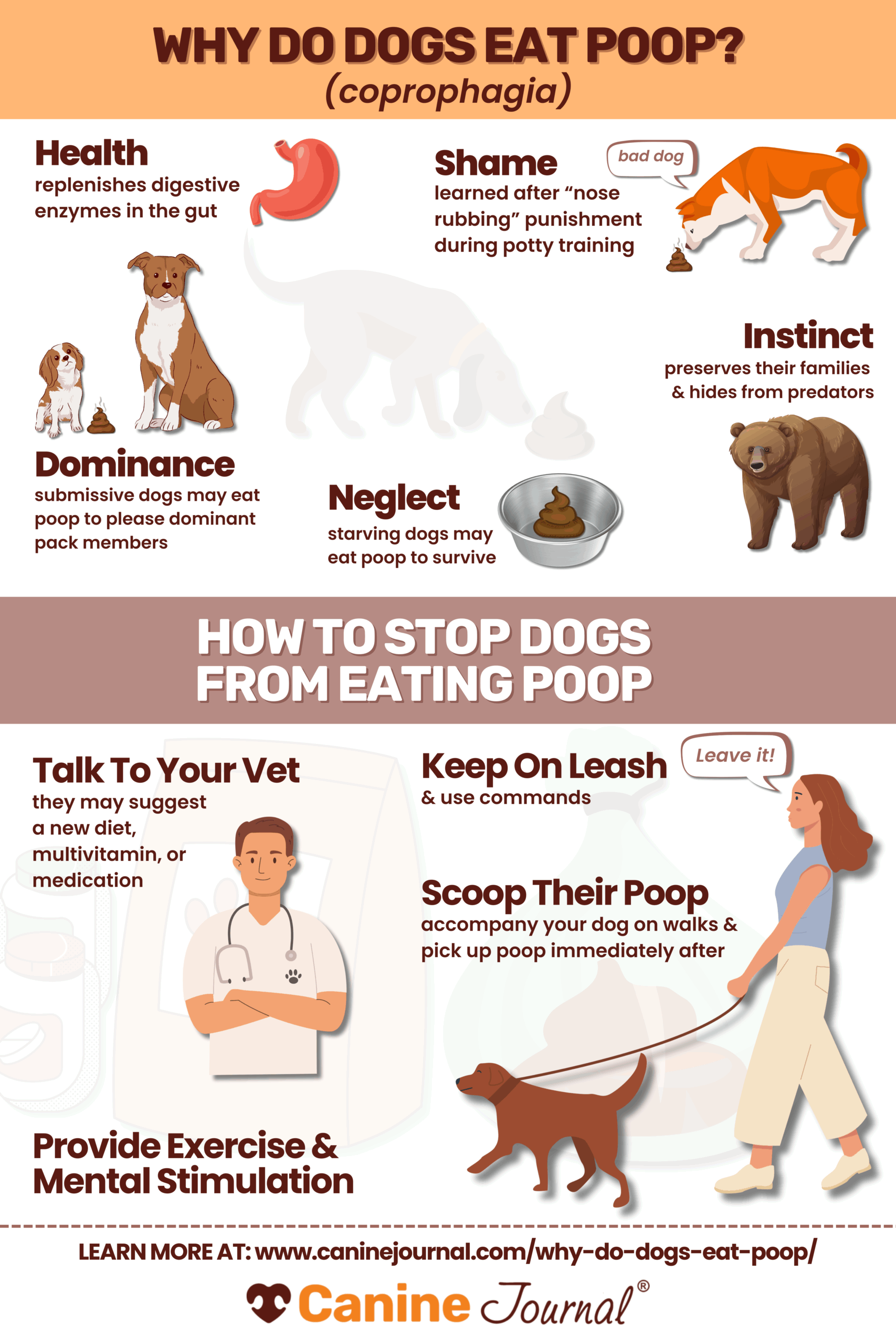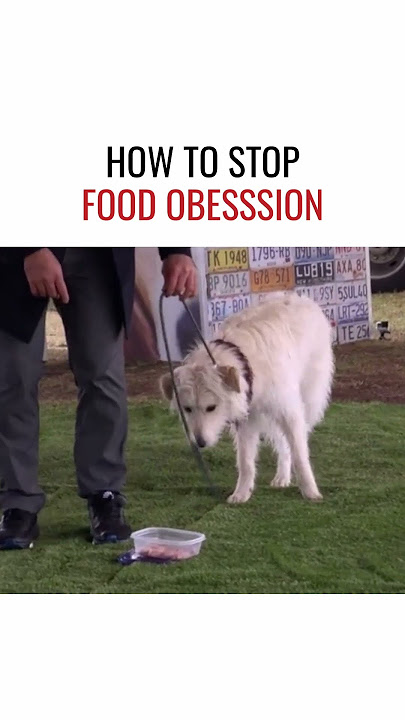Is your dog constantly begging for food or fixated on treats? This kind of food obsession can be stressful for both you and your furry friend.
You want your dog to enjoy mealtime without turning it into a nonstop battle over snacks. The good news is, you can help your dog break free from this obsession. You’ll discover simple, effective steps that will bring peace back to your home and make mealtime enjoyable again.
Keep reading to learn how to take control and help your dog find balance with food.

Credit: www.youtube.com
Causes Of Food Obsession
Food obsession in dogs can be a challenge for pet owners. Understanding the causes helps in managing this behavior.
There are several factors that can lead to a dog being overly focused on food. These include genetic factors, environmental influences, and health issues.
Genetic Factors
Some dog breeds are more prone to food obsession. These breeds have been genetically programmed to have a strong appetite.
Breeds like Labradors often have a higher tendency to seek food. This is due to genes that control hunger and satiety.
Environmental Influences
The environment where a dog lives can impact its eating habits. Dogs that have experienced food scarcity may develop an obsession.
In homes where food is left out frequently, dogs might learn to focus on food. This can cause them to be overly interested in eating.
- Access to food all day
- Irregular feeding times
- Competition with other pets
Health Issues
Health problems can also lead to food obsession in dogs. Certain medical conditions increase hunger or appetite.
Diseases like diabetes or thyroid problems make dogs feel hungrier. Regular vet check-ups can help identify these issues early.
- Diabetes
- Thyroid disorders
- Digestive issues

Credit: www.youtube.com
Signs Of Food Obsession
Food obsession in dogs can cause behavior problems. It affects their health and training.
Knowing the signs helps owners manage this issue early. Watch your dog’s behavior closely.
Constant Begging
Dogs with food obsession beg for food often. They may follow you around or stare nonstop.
This behavior shows they think about food all the time. It can be hard to ignore their requests.
Stealing Food
Food-obsessed dogs try to take food without permission. They grab food from counters or tables.
They may sneak food from other pets or even trash cans. This shows poor impulse control.
- Snatching food from plates
- Opening trash bins
- Taking food from other pets
Overeating Behavior
Dogs obsessed with food often eat too much. They may finish their meals too quickly.
This can lead to weight gain and health problems. Overeating is a clear sign of obsession.
Training Techniques
Dogs that obsess over food can be hard to train. Using the right training techniques helps reduce this behavior. Teaching your dog self-control makes walks and meals easier.
Training requires patience and consistency. Use simple commands and reward good behavior. This builds a strong bond and lowers food obsession.
Basic Obedience Commands
Start with simple commands like “sit,” “stay,” and “leave it.” These commands help your dog focus and listen. Teaching these commands is the first step to control food obsession.
Practice commands daily in short sessions. Use clear words and gentle hand signals. Consistent practice helps your dog understand what you want.
- Use “sit” to calm your dog before feeding.
- “Stay” helps your dog wait patiently for food.
- “Leave it” stops your dog from grabbing food without permission.
Impulse Control Exercises
Impulse control exercises teach dogs to wait and think. These exercises reduce the urge to grab food quickly. They also improve your dog’s self-discipline.
Try exercises like waiting at the door or pausing before eating. Reward your dog for staying calm. This practice lowers food obsession over time.
- Ask your dog to “wait” before you open the food bowl.
- Use a treat to practice “leave it” and increase waiting time.
- Play “drop it” to teach your dog to release food calmly.
Positive Reinforcement
Reward good behavior with treats, praise, or play. Positive reinforcement encourages your dog to repeat calm actions. It builds trust and reduces food obsession.
Give rewards immediately after your dog follows commands. Use small treats to avoid overfeeding. Consistent rewards help your dog learn faster.
- Give a treat when your dog waits calmly for food.
- Praise your dog warmly for following “leave it.”
- Use playtime as a reward for good impulse control.

Credit: www.caninejournal.com
Dietary Adjustments
Food obsession in dogs can cause stress and bad behavior. Changing their diet helps control this problem. Proper feeding habits make dogs calmer and healthier.
This section explains how balanced nutrition, scheduled feeding times, and avoiding table scraps can help break food obsession.
Balanced Nutrition
Dogs need a diet with the right mix of proteins, fats, and carbohydrates. Balanced nutrition keeps them full and satisfied. It lowers the urge to seek extra food.
Use high-quality dog food that fits your dog’s age and health. Avoid feeding only treats or scraps. These can cause hunger and food obsession.
- Include protein for energy and muscle health
- Add healthy fats for coat and brain function
- Use complex carbs for lasting energy
- Provide vitamins and minerals for overall health
Scheduled Feeding Times
Feed your dog at the same times every day. Scheduled meals create a routine. Dogs feel secure and less anxious about food.
Set two or three meal times daily. Remove leftover food after 20 minutes. This stops dogs from begging or overeating.
- Feed morning, noon, and evening
- Keep meals consistent in size and time
- Remove food bowls after mealtime
Avoiding Table Scraps
Giving table scraps teaches dogs to beg for human food. This behavior worsens food obsession. Avoid feeding scraps to keep control.
Stick to dog food and approved treats. This helps dogs focus on their meals. It also prevents overeating and weight gain.
- Do not feed from the dinner table
- Use dog treats only for training rewards
- Teach family members to avoid feeding scraps
Mental And Physical Stimulation
Dogs can become obsessed with food if they do not get enough mental and physical activity. Keeping your dog busy helps reduce this obsession.
Providing both mental challenges and exercise makes dogs happier and less focused on food alone.
Interactive Toys
Interactive toys keep your dog’s mind busy. These toys make dogs work to get treats or solve puzzles.
They help distract dogs from thinking only about food. Toys like treat balls or puzzle feeders are good choices.
- Treat-dispensing toys encourage problem-solving
- Puzzle feeders slow down eating
- Chew toys reduce boredom and anxiety
Regular Exercise
Exercise helps burn energy and lowers stress in dogs. A tired dog is less likely to obsess about food.
Daily walks, runs, or playtime improve your dog’s mood and behavior. Exercise also strengthens your bond.
- Take your dog for 30 minutes of walking daily
- Play fetch or tug-of-war to increase activity
- Try running or hiking for extra energy burn
Enrichment Activities
Enrichment activities stimulate your dog’s senses and mind. These activities give dogs new challenges outside food.
Try hiding treats, teaching new tricks, or using scent games. These keep dogs focused on fun, not just eating.
- Hide treats around the house for a fun search
- Teach simple commands and tricks regularly
- Use scent games to engage your dog’s nose
When To Seek Professional Help
Food obsession in dogs can cause stress for both pets and owners. Sometimes, the problem needs expert care to improve.
Knowing when to get professional help ensures your dog gets the right support. This can lead to better behavior and health.
Behavioral Therapists
Behavioral therapists study your dog’s actions closely. They find the root cause of food obsession and suggest ways to change it.
These experts use training techniques to reduce anxiety and improve your dog’s focus. They help create a calm eating routine.
Veterinary Advice
Your dog’s food obsession could be linked to health problems. A vet can check for medical issues that cause hunger or stress.
Vets offer advice on diet and feeding schedules. They may recommend special food or supplements to balance your dog’s needs.
Specialized Training Programs
Some dogs need focused training to stop food obsession. Specialized programs teach dogs to respond better to commands and controls.
These programs use rewards and exercises to build good habits. Trainers work with owners to keep training consistent at home.
- Controlled feeding times
- Ignoring begging behavior
- Positive reinforcement
- Safe space for meals
Frequently Asked Questions
What Causes Food Obsession In Dogs?
Food obsession in dogs often results from past food scarcity, boredom, or lack of proper training. It can also stem from anxiety or medical issues, making dogs overly focused on food.
How Can I Stop My Dog’s Food Obsession?
Consistent training, scheduled feeding times, and engaging your dog in physical and mental activities help reduce food obsession. Avoid free-feeding and use positive reinforcement to promote healthy eating habits.
Is Food Obsession Harmful To My Dog’s Health?
Yes, food obsession can lead to obesity, digestive problems, and behavioral issues. It’s important to address it early to maintain your dog’s overall health and wellbeing.
Can Treats Worsen Food Obsession In Dogs?
Excessive treats can increase food obsession by making your dog overly focused on rewards. Use treats sparingly and opt for healthier alternatives during training sessions.
Conclusion
Breaking food obsession in dogs takes patience and clear steps. Consistent training helps your dog learn better habits. Always reward calm behavior with treats or praise. Avoid feeding from the table or giving extra snacks. Keep mealtime regular and controlled to reduce begging.
Over time, your dog will focus less on food. Trust the process and stay calm. Your dog can enjoy meals without constant food obsession. Small efforts create big changes in your dog’s behavior. Keep practicing, and you will see progress soon.

